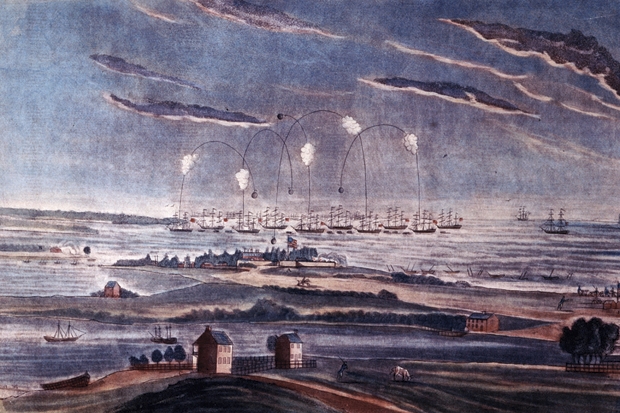Peter Snow explains that he decided to look into this extraordinary story when he realised how few people knew about it, and was inspired to write a book by the wealth and quality of eyewitness accounts from both sides. The result is superb. When Britain Burned the White House is an exemplary work of history — lucid, witty and humane, with terrific pace, and so even-handed that it will surely be received as well in America as here.
Annoyed by what he regarded as the excesses of the British empire — its fight with Napoleon interfered with America’s trade, it was in the habit of pressing American citizens into the Royal Navy, and it supported the Indian tribes who stood in the way of American settlers — President James Madison had declared war in June 1812. American forces had tried to seize parts of Canada, and in the spring of 1813 had burned York (Toronto), reducing its parliament buildings to ashes.
For the British the war was a tedious and debilitating sideshow, and after Napoleon’s exile in the spring of 1814 Lord Liverpool resolved to land a decisive blow. On the morning of 17 August the watchman at Point Lookout, at the mouth of the Potomac River on Chesapeake Bay, awoke to the sight of some 50 British warships. They were there to give ‘Jonathan’ — as the British called the revolutionary soldiers of the War of Independence — ‘a good drubbing’, and intent on ‘insulting’ the American capital.
Washington, some 80 miles upriver, was then little more than a village in a swamp, albeit with such monumental buildings as the Capitol and the White House, which was usually called the President’s House, and was largely staffed by slaves — a sore point. The Americans were terrified that their slaves would join the British ‘Black Corps’, which many did, having first been freed. The fearsome Rear Admiral George Cockburn, who led the campaign with Major General Robert Ross, reported that they ‘are really very fine fellows’.
John Armstrong, the American Secretary of War, was corrupt, incompetent and complacent, and thought there was no danger of an attack on Washington, though Madison had warned him it was a likely target. The American defenders were two or three times more numerous than the British force of 4,500, but were volunteer militiamen up against veteran regulars — the conquerors of Napoleon — and they were led by Brigadier General William Winder, who was almost comically hopeless, at one point falling off his horse. He advanced and retreated them so often that by the time they finally engaged the British at Bladensburg on 24 August they were quite exhausted, and were in due course routed, leaving Washington wide open.
That evening the redcoats entered the Capitol, where Cockburn is said to have mounted the Speaker’s chair to put the motion, ‘Shall this harbour of Yankee democracy be burned? All for it will say Aye.’ They went on to dine at the White House, where a feast had been prepared for the victorious American generals. ‘The fare… intended for Jonathan,’ wrote Ross in a letter home, ‘was voraciously devoured by John Bull, and the health of the Prince Regent… was drunk in the best wines, Madison having taken to his heels…’ (Until George W. Bush in September 2001, Madison was the only president to become a fugitive in his own country.) They then looted the house and set it alight. They were, however, polite to the citizenry, and respectful of private property.
Emboldened by this tremendous exploit, Cockburn was all for pressing 35 miles up the road to Baltimore, a much bigger and richer city, which faced the sea and was hardly defensible against attack by land, but Ross was not to be persuaded, and on the night of the 25 August the British marched away.
The next month, though, they attacked Baltimore by sea, and in the American mind the failure of that attack obliterated the humiliation of Washington. On 14 September, after Fort McHenry had been shelled through the night, Francis Scott Key, a young American lawyer of literary inclinations, who had watched the rockets’ red glare, and the bombs bursting in air, peered into the dawn’s early light to see which flag was flying over the fort, and found that the star-spangled banner yet waved. He immediately wrote a poem, which was published in a local paper, and then set to the tune of an old English song, ‘Anacreon in heaven’. In 1931 it became the US national anthem.
The peace agreed that December by the Treaty of Ghent left both sides much as they had been before — the only losers were the poor old Indians, betrayed by Canadian indifference — but Snow concludes that the War of 1812 marked ‘the coming of age of the United States’.






Comments